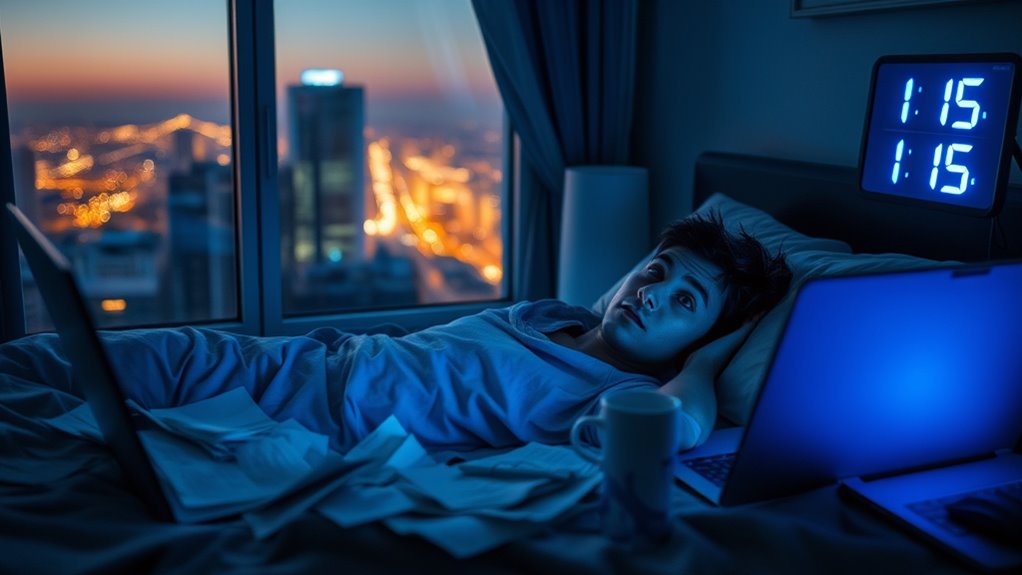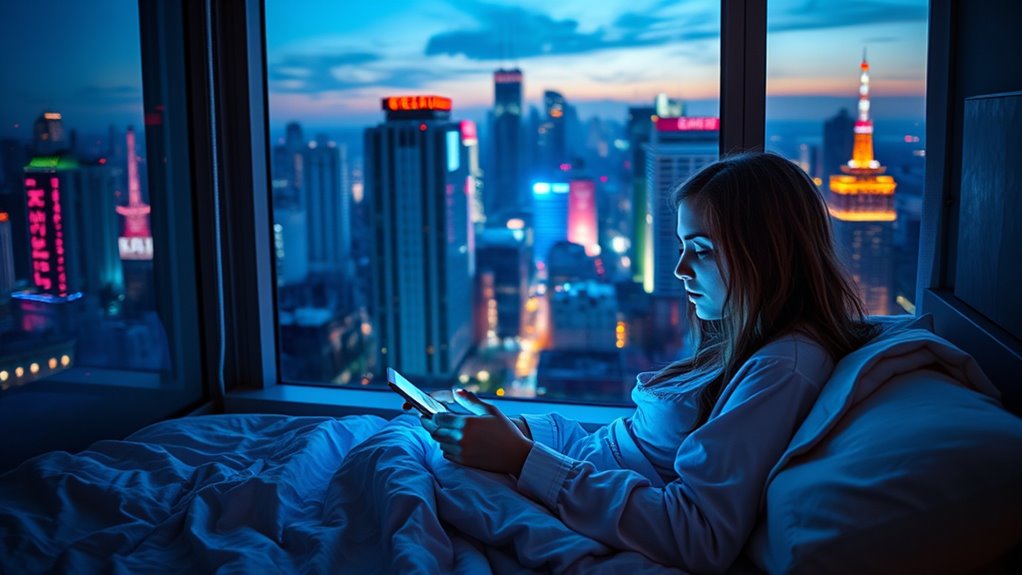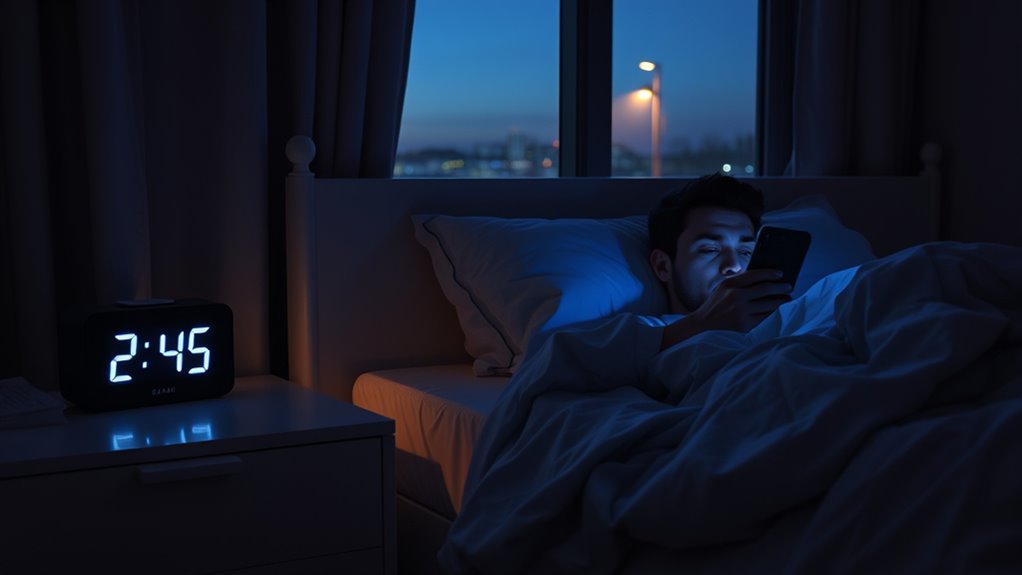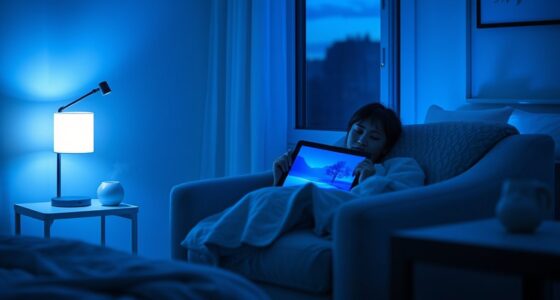Social jetlag happens when your internal body clock gets out of sync with your sleep schedule due to lifestyle choices, work demands, or technology use. Staying up late, using screens late at night, or irregular routines can disrupt your sleep-wake cycle, impacting your health, mood, and focus. If you want to understand how to manage and prevent social jetlag effectively, there’s much more to discover about its causes and solutions.
Key Takeaways
- Social jetlag occurs when internal biological clocks are misaligned with external sleep schedules due to lifestyle differences.
- Factors like shift work, social activities, and screen time contribute to irregular sleep patterns and circadian disruption.
- This misalignment increases risks of obesity, metabolic issues, mental health problems, and overall physical health decline.
- Recognizing signs such as fatigue, mood swings, and sleep difficulties helps in managing social jetlag effectively.
- Strategies like maintaining consistent routines, limiting screen exposure, and using sleep tracking can mitigate its effects.
What Is Social Jetlag and How Does It Occur?

Social jetlag happens when your internal body clock, or circadian rhythm, gets out of sync with your actual sleep schedule, often due to differences between workdays and free days. Your chronotype variability influences how much your sleep times shift, making some people more vulnerable to social jetlag than others. When you stay up late or sleep in on weekends to recover from weekday sleep deprivation, you’re engaging in weekend recovery, but this can worsen your circadian misalignment. This mismatch causes feelings of fatigue and grogginess during the week, as your body struggles to adapt. The fluctuating sleep patterns disrupt your biological clock, making it harder to maintain consistent sleep-wake cycles. Recognizing the effects of circadian rhythm disruption helps you understand how your lifestyle choices contribute to social jetlag. Properly managing your sleep schedule and maintaining consistent routines can reduce sleep disturbances and improve overall well-being. Additionally, understanding how to diversify investments in your financial planning can be akin to aligning your sleep habits—both require careful, strategic adjustments to achieve balance and stability. Incorporating nutrient-rich ingredients such as chia seeds or celery juice powder into your diet can support overall health and help regulate your biological rhythms, further aiding in the prevention of social jetlag. Using SWIFT/BIC codes properly can help ensure secure financial transactions, reflecting the importance of precise synchronization—similar to maintaining consistent sleep schedules.
The Science Behind Biological Clocks and Sleep Patterns

Biological clocks, also known as circadian rhythms, are internal systems that regulate your sleep-wake cycle over a 24-hour period. These rhythms align your body’s functions with day and night, helping you feel alert or sleepy at appropriate times. Central to this process is melatonin regulation, which controls your sleep signals. When it gets dark, your brain increases melatonin production, making you feel sleepy. Conversely, exposure to light suppresses melatonin, signaling your body to wake up. Circadian rhythms are influenced by environmental cues like light and temperature, keeping your sleep patterns consistent. Disruptions in these internal clocks can lead to irregular sleep schedules, affecting your overall health and daily functioning. Understanding this science helps explain why maintaining regular sleep times is essential. Additionally, factors such as shift work or frequent travel can cause social jetlag, leading to further misalignment of your biological clock. Recognizing the importance of environmental cues can help you better manage your sleep schedule and reduce circadian disruptions, especially since light exposure plays a critical role in synchronizing your internal clock. Moreover, advances in biological clock research are providing new insights into how to mitigate social jetlag and improve sleep health.
Common Causes of Misaligned Sleep Schedules in Daily Life

Your work schedule often forces you to wake up early or stay late, disrupting your natural sleep cycle. Social events and leisure activities can also push you to stay up later than your body wants. These everyday demands make it hard to keep your sleep aligned with your biological clock. Additionally, irregular work hours or remote work routines can further contribute to lifestyle imbalance, making it difficult to maintain consistent sleep patterns. Recognizing the importance of patchology.ORG can help ensure your equipment functions optimally and reduces disruptions during your projects. Understanding how sound therapy techniques are used can also highlight the importance of securing personal devices against disruptions.
Work Schedule Demands
Work schedule demands often force people to wake up or go to bed at times that conflict with their natural sleep patterns. Shift work is a prime example, requiring you to sleep during the day and stay awake at night, disrupting your circadian rhythm. This misalignment leads to social jetlag and can affect your overall health. Travel fatigue also plays a role; crossing time zones or irregular work hours causes your internal clock to lag behind your actual schedule. When you have early morning shifts or late-night duties, your body struggles to adapt, making it harder to achieve restful sleep. Over time, these demands can lead to chronic sleep deprivation and increased fatigue, impacting your daily functioning and well-being. Adjusting your sleep environment to support bedroom comfort can help mitigate some of these effects.
Social and Leisure Activities
Have you ever stayed out late with friends or binge-watched shows into the early morning? Social and leisure activities often push your sleep schedule off balance. If you’re a night owl, you might naturally prefer late nights, making it harder to wake up early. Social drinking can extend your nights, disrupting your circadian rhythm. Here are some common causes:
- Attending late-night parties or events.
- Engaging in binge-watching sessions that run into the early hours.
- Participating in social drinking, which delays bedtime.
- Being a night owl, choosing to stay up late despite needing sleep.
- The influence of digital entertainment that encourages prolonged screen time, further disrupting your sleep patterns.
These activities make it challenging to keep a consistent sleep schedule, leading to social jetlag and fatigue during your busy days. Additionally, ignoring progress reviews of your sleep habits can prevent you from recognizing patterns that contribute to misaligned sleep schedules.
Health Consequences Associated With Social Jetlag

Social jetlag has significant health implications because it disrupts your body’s internal clock, leading to various physiological imbalances. This disruption often causes sleep deprivation, which affects your overall health and alertness. When your sleep schedule is misaligned, your body struggles to regulate hormones and metabolic processes, increasing your risk for obesity, diabetes, and cardiovascular issues. Additionally, social jetlag can take a toll on your mental health, heightening feelings of stress, anxiety, and depression. You might find yourself feeling more fatigued and less able to concentrate. Over time, these effects can compound, making it harder to maintain a healthy lifestyle. Addressing social jetlag is essential to safeguarding both your physical and mental well-being. Disrupted circadian rhythms can further exacerbate these health problems, emphasizing the importance of maintaining consistent sleep patterns. Recognizing the influence of biological clocks on overall health underscores the need for regular sleep schedules. Advances in biometric monitoring and understanding how AI detection methods analyze and identify irregular sleep patterns could lead to better tools for managing social jetlag. Moreover, ongoing research in AI security aims to develop more sophisticated methods to detect and address irregularities in sleep data effectively.
Recognizing the Signs of Social Jetlag in Yourself

Recognizing the signs of social jetlag in yourself starts with paying attention to how your body responds to changes in your sleep schedule. If you notice consistent tiredness or difficulty waking up on weekdays despite enough sleep, it could be a sign of sleep deprivation caused by irregular routines. You might also experience:
Pay attention to ongoing tiredness and trouble waking up early, as signs of social jetlag and irregular sleep patterns.
- Feeling groggy or disoriented during the day, especially after weekends or days off
- Struggling to fall asleep at your usual bedtime on workdays
- Excessive sleepiness during the day, even after a full night’s sleep
- Mood swings or difficulty concentrating, which often stem from inconsistent sleep patterns
Being aware of these signs helps you identify if your body is reacting to misaligned schedules, a common effect of social jetlag.
Strategies to Minimize the Impact of Social Jetlag

To reduce the effects of social jetlag, you can implement consistent sleep routines that align your weekday and weekend schedules as closely as possible. Good sleep hygiene is essential—set a regular bedtime and wake time, even on weekends, to promote circadian alignment. Avoid large meals, caffeine, and screens before bed, as these disrupt your internal clock. Prioritize exposure to natural light during the day to reinforce your circadian rhythm. Creating a relaxing pre-sleep routine signals to your body that it’s time to wind down, helping you fall asleep faster. Additionally, monitoring changes in sleep quality can help identify if your sleep environment is conducive to restful sleep. Incorporating wearable sleep trackers can provide valuable data to help optimize your sleep habits and better understand your circadian patterns. Maintaining a consistent sleep schedule can also help leverage data-driven strategies to optimize your overall sleep health. By maintaining consistent sleep habits, you minimize the mismatch between your biological clock and social obligations, reducing fatigue, mood swings, and overall health risks associated with social jetlag.
The Role of Technology and Society in Sleep Misalignment

Technology and societal expectations play a significant role in sleep misalignment by encouraging behaviors that disrupt your natural circadian rhythms. Your digital dependency keeps you glued to screens late into the night, making it harder to fall asleep. Society often promotes staying connected and productive, pushing you to prioritize work or social media over rest. Consider these factors:
- Constant notifications that interrupt your sleep cycle.
- Blue light exposure from devices delaying melatonin production.
- Societal pressure to be always available, reducing downtime.
- Cultural norms that value productivity over rest.
These elements create a mismatch between your biological clock and daily demands, fueling social jetlag. Recognizing the influence of technology and societal expectations helps you better address sleep misalignment in modern life.
Future Perspectives and Research on Social Jetlag

As research on social jetlag advances, scientists are increasingly exploring its long-term health consequences and the effectiveness of various intervention strategies. Recent chronobiology advancements help identify how circadian misalignments impact physical and mental health over time. Future studies will likely focus on personalized approaches to reduce social jetlag, including tailored sleep schedules and behavioral modifications. Policy interventions may also play a pivotal role, such as adjusting school start times or work hours to better align with natural biological rhythms. Researchers aim to develop evidence-based guidelines that promote healthier sleep patterns and mitigate social jetlag’s effects. As this field evolves, your understanding of biological timing and societal adjustments will be key to fostering better health outcomes in modern societies.
Frequently Asked Questions
Can Social Jetlag Be Completely Eliminated With Lifestyle Changes?
Social jetlag can be minimized but probably not completely eliminated. By making lifestyle adjustments like maintaining consistent sleep and wake times, and practicing good sleep hygiene, you can reduce its effects. Prioritizing regular sleep schedules even on weekends helps align your internal clock. While some social jetlag may persist due to external demands, these changes markedly improve your overall sleep quality and daily alertness.
How Does Social Jetlag Affect Mental Health and Cognitive Performance?
Struggling with social jetlag, you might notice your mind muddled and motivation minimized. This circadian disruption can cause cognitive chaos, hampering focus and decision-making. Elevated stress levels weigh heavily, worsening mood swings and mental health woes. When your internal clock is off balance, it’s harder to process information, remember details, or stay alert. Addressing these issues helps harmonize your sleep schedule, boosting your brain’s brilliance and balancing your emotional well-being.
Are Certain Age Groups More Vulnerable to Social Jetlag?
You might notice that adolescents are more vulnerable to social jetlag, as their biological clocks shift during puberty, making it harder to maintain consistent sleep schedules. In contrast, the elderly tend to show more resilience, often experiencing less disruption from social and environmental changes. Understanding these differences helps you recognize how age influences your body’s ability to adapt to irregular sleep patterns, impacting overall health and well-being.
What Role Do Cultural Differences Play in Sleep Schedule Misalignment?
You might find that cultural differences considerably influence your sleep schedule. Cultural norms and sleep rituals shape when you go to bed and wake up, often leading to misalignment with natural circadian rhythms. For example, in some cultures, late-night socializing or siestas can shift your sleep patterns. Recognizing these influences helps you understand why your sleep schedule varies and how cultural expectations impact your overall sleep health.
How Can Employers Support Employees Experiencing Social Jetlag?
Employers can support employees experiencing social jetlag by offering flexible scheduling, allowing staff to align work hours with their natural sleep patterns. Implementing wellness programs that educate about sleep health also helps employees manage fatigue. By promoting a culture that values work-life balance and providing options like remote work or adjustable hours, you help reduce the impact of social jetlag, boosting overall productivity and well-being.
Conclusion
Understanding social jetlag is essential because it affects your health and daily functioning. Did you know that up to 70% of adults experience some form of sleep misalignment on weekends? By recognizing the signs and adjusting your schedule, you can reduce its impact. Prioritizing consistent sleep patterns and limiting technology use before bed helps protect your well-being. Taking these steps now can lead to better sleep, improved mood, and a healthier life overall.









